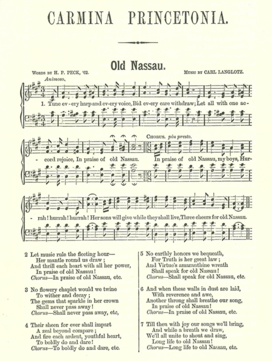The following story was originally published in the March 17, 1987, issue of PAW.

Last fall Janet Sarbanes ’89, daughter of Senator Paul Sarbanes ’54 and sister the 1986 Pyne Prize winner, revived the question in a column for The Daily Princetonian. “I had sung ‘Old Nassau’ many times before I came to Princeton,” she wrote, “as my father and both my brothers were Princeton students before me. But I never really heard the words until I was actually a student here, and wanted to sing along with everyone else about my new school with a hopeful devotion. I realized all of a sudden that I couldn’t throw myself wholeheartedly into the singing of ‘Old Nassau’ because there was no place for women — for me — in its lyrics. It seemed incredible that a co-ed school could condone, tolerate, or even ignore the exclusive nature of its school song.”
The Prince followed up the next day with an editorial declaring that “the time has come to make ‘Old Nassau’ an alma mater for all Princetonians. … Some would argue that the change we recommend is minor, but the words of a song which stands for the school have a truly major significance. The song plays a role in many university events, and as such makes a statement about the university. The argument that nothing should be changed out of reverence for tradition should also be rejected. The tradition of singing ‘Old Nassau’ will still exist, it will simply become a bit more inclusive.”
The issue may have found more fertile ground this time because of recent concerns about Princeton’s attractiveness to women students following their drop in last year’s admissions. In December, by a margin of 23-4, the USG Caucus adopted solution calling for such a change in the lyrics of “Old Nassau.” A subsequent referendum, for which a little over a third of the student body turned out, failed by a margin of 872-794 — but had no force because it takes a minimum of 25 percent voting no to overturn a USG resolution.
At its January meeting, the Executive Committee of the Alumni Council overwhelmingly approved a similar resolution recommending that the lyrics be changed to “represent better the entire Princeton University community in a manner consistent with the traditional purpose of the song.” According to Scott Magargee ’52, the council’s chairman, “a very large majority” of the committee’s 53 members was in attendance and the decision was “almost unanimous.” He added, “The general mood was that this was an idea whose time had come.”
Last month, the Board of Trustees officially changed five words in the chorus of “Old Nassau.” In the first line, “my boys” was made “we sing”; and in the third line, “her sons” was replaced by “our hearts” — which requires that the following “they” become “we.” Although the song has four verses, only the first verse and the chorus are usually sung. They now are:
Tune every heart and every voice,
Bid every care withdraw;
Let all with one accord rejoice,
In praise of Old Nassau.
In praise of Old Nassau we sing,
Hurrah! Hurrah! Hurrah!
Our hearts will give, while we shall live,
Three cheers for Old Nassau.
The specific changes in wording were arrived at by a nine-member ad hoc com mittee that included Clark Gesner ’60, a professional songwriter; Paul Lansky *73, a professor of music at Princeton; the current president and immediate past president of the USG; and the four top elected officers and director of the Alumni Council.
These are by no means the first changes to be made in Princeton’s alma mater. The original version — written in 1859 by a freshman, Harlan Page Peck — was supposed to be sung to the tune of “Auld Lang Syne”; when that proved unsuccessful, new music was composed by Karl A. Langlotz, a German teacher at the university who had studied music under Franz Liszt. Then, in the 1880s, the opening line, “Tune every harp and every voice,” was changed to “every heart.” Of Peck’s original seven verses, three had dropped out of use by early in this century.
Announcing the trustees’ action, President Bowen said, “‘Old Nassau’ was written to be inclusive of the Princeton of its day; these changes in lyric allow it to be inclusive for today’s Princeton. For more than a century, students and alumni have expressed their affection for Princeton through this song. We very much want that tradition to continue.”











No responses yet